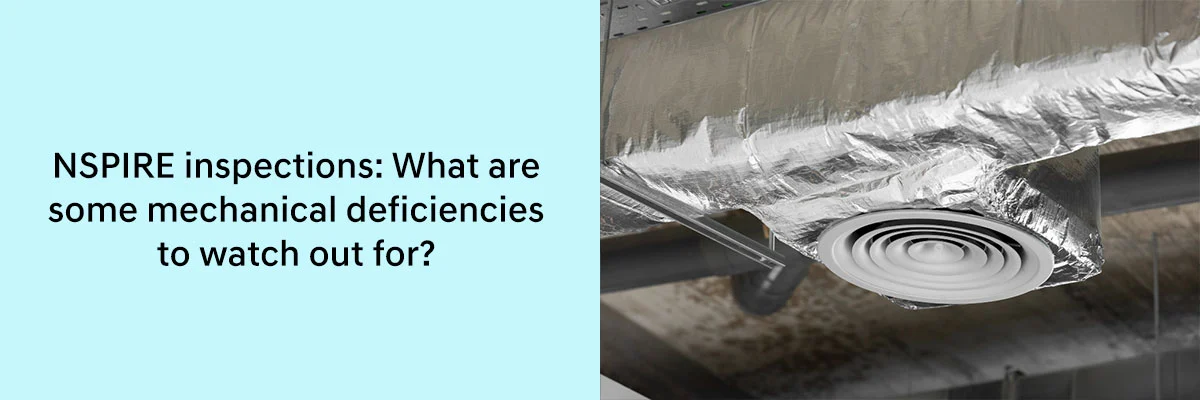Home inspections are a crucial step in the process of buying or selling a property. They provide a comprehensive assessment of a home’s condition, helping both buyers and sellers make informed decisions. After the introduction of REAC, the National Standards for the Physical Inspection of Real Estate (NSPIRE) has further standardized this process, ensuring that inspections are thorough and consistent across the board. Both REAC and NSPIRE are for the purpose of making living easier and healthier for people, however, there is a difference between the two.
When it comes to NSPIRE inspections, one essential aspect to focus on is mechanical deficiencies. Mechanical systems within a home encompass a wide range of components, from heating and cooling systems to plumbing and electrical systems. Identifying these deficiencies is vital because they can impact a home’s safety, comfort, and value.
In this blog, we’ll explore some common mechanical deficiencies to watch out for during NSPIRE inspections.
Mechanical Definitions in NSPIRE to watch out for:
1. Heating, Ventilation, and Air Conditioning (HVAC) Systems:
- Inefficient Furnaces or Boilers: Inspectors should check for furnaces or boilers that are outdated or operating inefficiently. These can result in higher energy bills and reduced comfort.
- Dirty or Clogged Air Filters: Clogged air filters can hinder the HVAC system’s performance and lead to poor indoor air quality.
- Leaking Ductwork: Leaks in the ductwork can lead to energy loss and uneven heating or cooling throughout the home.
2. Plumbing Systems:
- Leaky Pipes: Inspectors must look for any visible signs of water damage, such as staining or dampness, which could indicate leaky pipes.
- Inadequate Water Pressure: Low water pressure in faucets and showers can be indicative of plumbing issues within the property.
- Corroded or Deteriorating Pipes: Aging pipes made of materials like galvanized steel can corrode or deteriorate over time, potentially causing water quality and flow problems.
3. Electrical Systems:
- Outdated Wiring: Homes with outdated electrical wiring may be at risk of electrical fires and not be equipped to handle modern electrical demands.
- Overloaded Circuits: Overloaded circuits can lead to tripped breakers or blown fuses, posing safety hazards.
- Faulty Outlets or Wiring: Inspectors should check for damaged outlets or wiring, as they can cause electrical shocks or fires.
4. Appliances:
- Non-Functional Appliances: Make sure all appliances included with the property are in working order.
- Unsafe Gas Appliances: Gas stoves, furnaces, or water heaters should be checked for gas leaks, ventilation issues, or other safety concerns.
5. Water Heaters:
- Rusty or Leaking Tanks: Inspectors should examine the water heater for signs of rust or leakage, which can lead to water damage and inefficiency.
- Improper Ventilation: Inadequate ventilation can result in the buildup of harmful gases, posing a safety risk.
6. Fireplaces and Chimneys:
- Creosote Buildup: For homes with wood-burning fireplaces, inspectors should assess the chimney for creosote buildup, which can lead to chimney fires.
- Damaged Flue Liners: Damaged or deteriorating flue liners can allow carbon monoxide to enter the home.
7. Insulation and Ventilation:
- Inadequate Insulation: Poor insulation can lead to energy loss and discomfort.
- Improper Ventilation: Insufficient attic or crawlspace ventilation can cause moisture issues and damage structural components.
8. Safety Features:
- Missing or Non-Functional Smoke Alarms and Carbon Monoxide Detectors: Ensuring that these devices are installed and operational is crucial for the safety of occupants.
End note:
NSPIRE inspections provide a standardized and comprehensive evaluation of a property’s mechanical systems. By being aware of the common mechanical deficiencies to watch out for, both buyers and sellers can ensure a smoother transaction process and a safe, comfortable living environment. Remember that hiring a qualified inspector is crucial to obtaining accurate and reliable information about a property’s condition.


